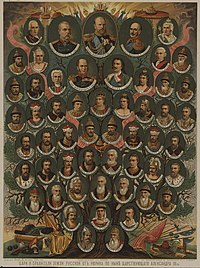
Back Урыс аҳәынҭқарра ахадацәа Abkhazian قائمة الملوك الروس Arabic ليستة اباطرة الروس 1721–1917 ARZ Rusiya hökmdarlarının siyahısı Azerbaijani Списък на руските владетели Bulgarian Seznam hlav ruského státu Czech Liste der russischen Herrscher German Κατάλογος μοναρχών της Ρωσίας Greek Listo de Regantoj de Rusio Esperanto Anexo:Monarcas rusos Spanish
| Monarchy of Russia | |
|---|---|
 | |
 Visualisation of Russian monarchs as a tree (1886) | |
| Details | |
| Style | His/Her Imperial Majesty |
| First monarch | Rurik (as Prince) |
| Last monarch | Nicholas II (as Emperor) |
| Formation | 862 |
| Abolition | 15 March 1917 |
| Residence | Winter Palace, Moscow Kremlin |
| Appointer | Hereditary |
| Pretender(s) | |
This is a list of all reigning monarchs in the history of Russia. The list begins with the semi-legendary prince Rurik of Novgorod, sometime in the mid-9th century, and ends with Nicholas II, who abdicated in 1917, and was executed with his family in 1918. Two dynasties have ruled Russia: the Rurikids (862–1598) and Romanovs (from 1613).[1]
The vast territory known as Russia covers an area that has been ruled by various polities since the 9th century, including Kievan Rus', the Grand Principality of Vladimir, the Grand Principality of Moscow, the Tsardom of Russia and the Russian Empire, and the sovereigns of these polities have used a range of titles. Some of the earliest titles include knyaz and veliky knyaz, which mean "prince" and "grand prince" respectively, and have sometimes been rendered as "duke" and "grand duke" in Western literature. After the centralized Russian state was formed, this was followed by the title of tsar, meaning "caesar", which was disputed to be the equal of either a king or emperor, and finally the title of emperor.
According to Article 59 of the 1906 Russian constitution, the Russian emperor held several dozen titles, each one representing a region which the monarch governed.[2]
- ^ Burbank, Jane; Ransel, David L. (22 September 1998). Imperial Russia: New Histories for the Empire. Indiana University Press. p. 38. ISBN 978-0-253-21241-2.
Previous works equated the history of Russia with the history of Orthodoxy in Russia, but the new histories equated it with the fortunes of Russia's two dynasties... the Riurikids (862–1598) and the Romanovs (from 1613)...
- ^ Blaustein, Albert P.; Sigler, Jay A. (1988). Constitutions that Made History. Paragon House Publishers. p. 265. ISBN 978-0-913729-67-0.